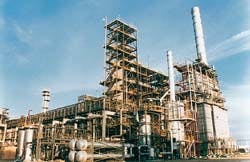Uzbekistan refining infrastructure undergoing modernization
The catalytic reformer at the new Bukhara refinery in Uzbekistan is shown; the complex is the first grassroots refinery to be built in the former Soviet Union since its breakup.While Uzbekistan is currently focusing on its upstream sector for foreign petroleum investment, efforts are continuing in development of a modern refining infrastructure in that country.
Recent downstream efforts include a $200 million upgrade of the Fergana refinery and completion of the new refinery near Bukhara, the first grassroots refinery built in the former Soviet Union (FSU) since its breakup.
Uzbekistan's 50,000 b/d Bukhara refinery, commissioned by the national oil and gas company Uzbekneftegas in May 1995, was dedicated on Aug. 22, 1997. Construction was completed on June 13, 1997, within the 24-month contract schedule, and start-up on Aug. 3, 1997, came 1 month ahead of schedule.
All of this is considered remarkable, even by Western standards, especially considering that Uzbekistan is a "double-landlocked" country (all of its neighbor also are landlocked). All the 150,000 metric tons of equipment and material for the project, except for sand and cement, had to be imported by road and rail from France, Japan, Turkey, and the U.S.
Bukhara project details
The $400 million grassroots refinery was built by France's Technip SA under a turnkey contract (the first in an FSU country) in the Karaoul Bazar area, on a semi-arid site in the heart of the central Asian steppe, 55 km from Bukhara.Financing was provided, in part, by the Uzbek government's own resources and completed with several export credit facilities from France, Japan, and the U.S. Accordingly, Japan's Marubeni Corp. and JGC Corp., supporting the Japanese credits, and Technip's U.S. affiliate Technip Inc., supporting U.S. and French credits, were associated with the project.
Technip led the contractors' group and was responsible for turnkey design and construction of the process units ($300 million). Storage and utilities facilities were handled directly by Uzbekneftegas ($100 million).
The units include a 45,000 b/d atmospheric distillation unit (Technip technology), a 15,420 b/d naphtha hydrodesulfurization unit and a 117,200 b/d gas oil hydrodesulfurization unit (both Institut Fran?ais du Petr?le technology), a 6,000 b/d Kerose sweetening unit (Merichem Co.), a 12,900 b/d regenerative reformer (IFP), a gas plant and sour water treatment unit (Technip), a sulfur recovery unit (Comprimo BV), and one control station and two electrical substations.
The Bukhara refinery is designed to process condensate produced from Kokdumalak gas field and produce high-octane gasoline for export as well as unleaded gasoline, kerosine, and desulfurized diesel fuel for the local market.
The refinery is designed for a later doubling of capacity and to process not only condensate but also crude from Uzbek oil fields. In its current configuration, it has increased Uzbekistan's refining capacity by about 30%.
Other Uzbek refining
The Bukhara refinery is Uzbekistan's third, along with the Alty-Aryk and Fergana oil refineries, which have a combined capacity of 172,000 b/d.In 1996, these two refineries processed about 49 million bbl of crude oil and condensate, with the Fergana refinery accounting for 78.3% of that volume.
A diesel fuel hydrodesulfurization plant is to be completed at Fergana by next year under a turnkey contract signed with Japan's Mitsui Co. and Toyo Engineering Corp. The complex will include diesel fuel hydrotreating units, sour gas amine treating units, and elemental sulfur production and granulating facilities.
The volume of oil and condensate refined in Uzbekistan in 1997 was estimated at 55.5 million bbl, broken down as: Fergana, 27.6 million bbl of crude and 12 million bbl of condensate; Alty-Aryk, 7.4 million bbl of crude and 3.5 million bbl of condensate; and Bukhara, 4.9 million bbl of condensate.
A special program of the Uzbek republic outlines further prospects for oil refining development to provide Uzbekistan with high-quality fuels and lubricating oils.
The program focuses on completing the second-phase expansion of the Bukhara refinery and includes the revamping and modernization of existing refineries, including new facilities, and the establishment of corporations with foreign ownership in refining facilities.
Since 1995, Uzbekistan has discontinued importing Western Siberian crude oil to Uzbek refineries. And with the Bukhara refinery, refined product imports from Russia and Kazakhstan are no longer likely to be needed.
Copyright 1998 Oil & Gas Journal. All Rights Reserved.
